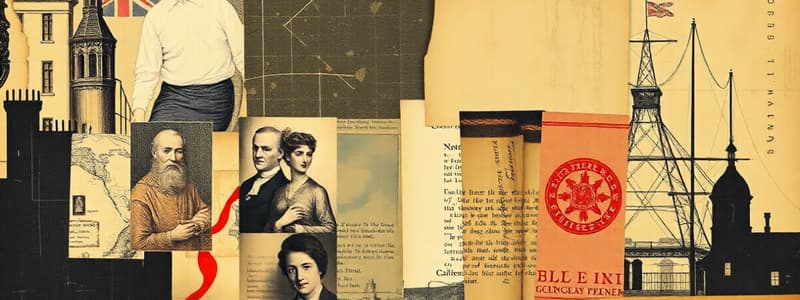Podcast
Questions and Answers
Who is considered the father of Old English poetry?
Who is considered the father of Old English poetry?
- Cynewulf
- Caedmon (correct)
- Alfred
- Bede
Caedmon was known for writing numerous extensive poems.
Caedmon was known for writing numerous extensive poems.
False (B)
What was Caedmon instructed to sing about in his dream?
What was Caedmon instructed to sing about in his dream?
the beginning of created things
Caedmon tended to the animals at the Northumbrian monastery of __________.
Caedmon tended to the animals at the Northumbrian monastery of __________.
Match the following poets with their known works:
Match the following poets with their known works:
Which manuscript is known as the illustrated poetic anthology?
Which manuscript is known as the illustrated poetic anthology?
King Alfred the Great primarily focused on improving Latin literacy in England.
King Alfred the Great primarily focused on improving Latin literacy in England.
What term describes the Anglo-Saxon poets who were skilled storytellers?
What term describes the Anglo-Saxon poets who were skilled storytellers?
The Old English language is the ancestor of ______ and Modern English.
The Old English language is the ancestor of ______ and Modern English.
Match the following dialects of Old English with their regions:
Match the following dialects of Old English with their regions:
Which type of poetry is NOT a characteristic of Old English literature?
Which type of poetry is NOT a characteristic of Old English literature?
There are approximately 200 surviving manuscripts from the Anglo-Saxon period.
There are approximately 200 surviving manuscripts from the Anglo-Saxon period.
What are the two types of Old English poetry?
What are the two types of Old English poetry?
Flashcards are hidden until you start studying
Study Notes
Anglo-Saxon Period Overview
- Spanned from 450 to 1066, covering literature in Anglo-Saxon (Old English).
- Genres include epic poetry, hagiography, sermons, Bible translations, legal works, chronicles, and riddles.
- Approximately 400 surviving manuscripts exist, with 189 deemed major.
Language and Dialects
- Old English is the basis for Modern English, tracing back to Germanic tribes.
- Part of the Anglo-Frisian group within West Germanic languages.
- Four main dialects:
- Northumbrian (northern England and southeastern Scotland)
- Mercian (central England)
- Kentish (southeastern England)
- West Saxon (southern and southwestern England)
Historical Context
- Significant literary production occurred mainly between the 9th and 11th centuries, in both Latin and vernacular.
- Old English literature is among the first written vernacular languages.
- Developed partly due to low Latin literacy among church officials.
- King Alfred the Great aimed to revive culture and proposed education in Old English, leading to the learning of Latin for those who excelled.
Old English Poetry
- Two primary forms: heroic Germanic pre-Christian poetry and Christian poetry.
Manuscripts
- Junius Manuscript (Caedmon Manuscript): An illustrated anthology of poetry.
- Exeter Book: An anthology located in Exeter Cathedral since the 11th century.
- Vercelli Book: Contains both poetry and prose, origins unresolved, kept in Vercelli, Italy.
- Nowell Codex: Mix of poetry and prose, significance in Old English literature.
Poetic Techniques
- Kenning: A descriptive phrase or compound word that conveys meaning (e.g., “swan's road” for the sea).
- Litotes: A form of understatement used for ironic effect.
Notable Poets
- Many Old English poets are anonymous; only twelve are named from Medieval sources.
- Noteworthy poets with known vernacular works: Caedmon, Bede, Alfred, and Cynewulf.
- Only Caedmon, Bede, and Alfred possess known biographies.
Caedmon
- Regarded as the father of Old English poetry.
- Originally tended animals at Northumbrian monastery Whitby Abbey.
- Unable to sing until inspired by a dream, where he was told to create a hymn about creation.
- Cædmon’s Hymn: The sole surviving piece attributed to him, consisting of nine lines.
Studying That Suits You
Use AI to generate personalized quizzes and flashcards to suit your learning preferences.




